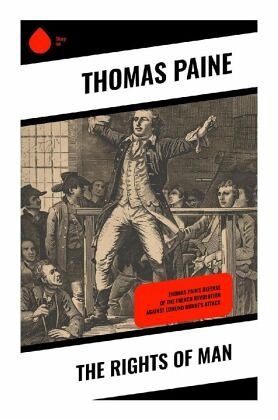
The Rights of Man
Thomas Pain's Defense of the French Revolution Against Edmund Burke's Attack
Versandkostenfrei!
Versandfertig in 6-10 Tagen
11,60 €
inkl. MwSt.

PAYBACK Punkte
0 °P sammeln!
In "The Rights of Man," Thomas Paine presents a compelling defense of the principles of democracy, individual liberty, and social justice against the backdrop of revolutionary thought in the late 18th century. Written in a direct and impassioned style, the book functions both as a critique of monarchy and a passionate endorsement of the rights granted to individuals by natural law. Employing rational argumentation and accessible language, Paine delves into themes of human rights, government accountability, and the foundation of civil society, sparking discussions that resonate deeply in the co...
In "The Rights of Man," Thomas Paine presents a compelling defense of the principles of democracy, individual liberty, and social justice against the backdrop of revolutionary thought in the late 18th century. Written in a direct and impassioned style, the book functions both as a critique of monarchy and a passionate endorsement of the rights granted to individuals by natural law. Employing rational argumentation and accessible language, Paine delves into themes of human rights, government accountability, and the foundation of civil society, sparking discussions that resonate deeply in the context of the Enlightenment and the burgeoning political revolutions in America and France. Thomas Paine, a key figure in the American Revolution, was driven by personal beliefs rooted in Enlightenment ideals and his experiences as a political activist. His earlier works, including "Common Sense," reflect his commitment to independence and equality, significantly influencing public opinion. Paine's own struggles with tyranny and his advocacy for the rights of the oppressed underscore the urgency and relevance of his message in "The Rights of Man," making it a seminal text in the canon of political philosophy. For anyone interested in the evolution of democratic thought or the foundations of modern civil society, "The Rights of Man" is an essential read. Paine's eloquent prose and incisive critiques challenge readers to consider their own roles within a democracy and the ongoing struggle for human rights, encouraging a discourse that is as relevant today as it was over two centuries ago.












